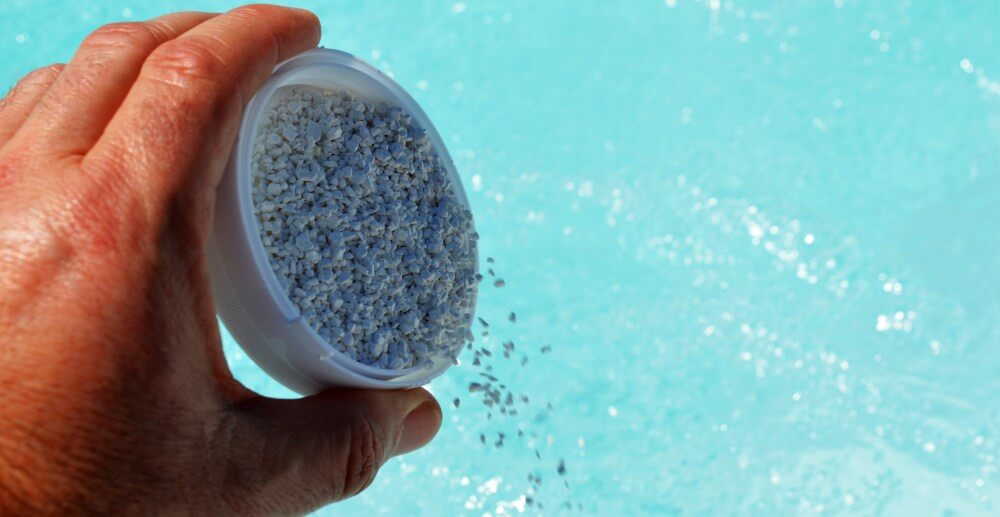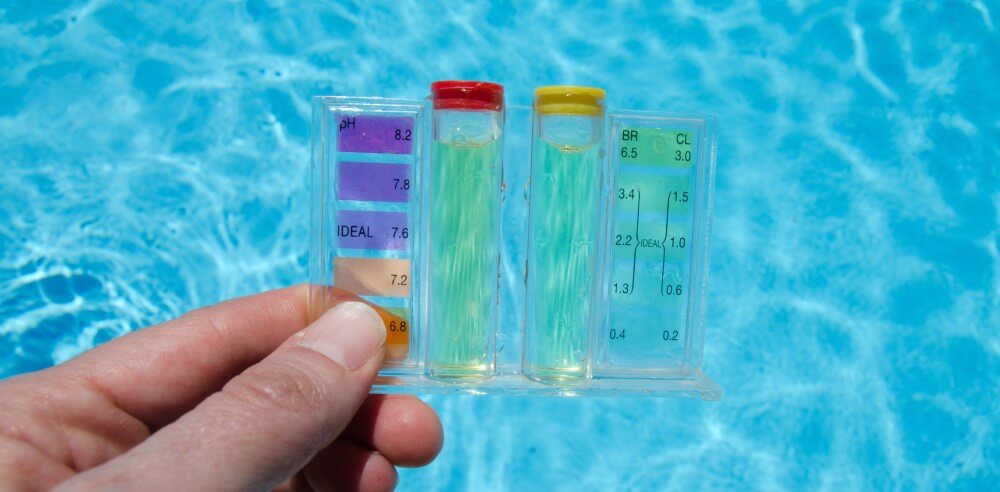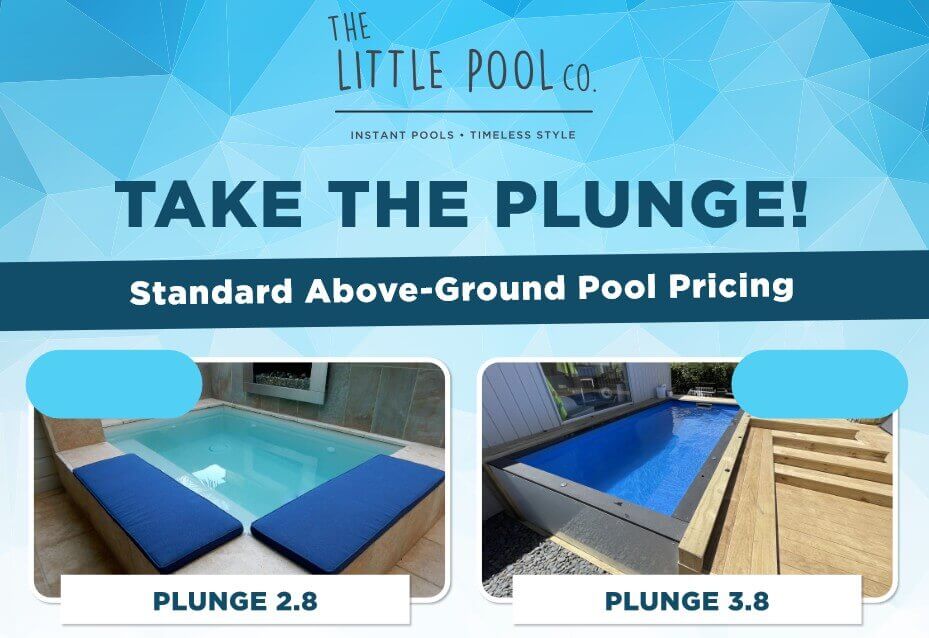The swimming pool market in Australia is now huge, and customers who want to invest in their own backyard pools are faced with a practically endless choice of different pool options. Sometimes this level of choice can be so overwhelming that it is difficult to narrow down the options and reach a decision about the type of pool you really want.
Salt water pools are becoming increasingly popular, so we have taken a look at the facts about them: how they work, their benefits and disadvantages, and whether or not they are more effective than chlorine pools when it comes to pool sanitisation, to help you decide if a salt water pool is the right choice for you.
What are salt water pools?
Many people believe that salt water pools contain sea water. This is not the case, as it would be extremely impractical due to the extremely high salt concentration found in sea water. Instead, in a salt water pool, salt is used to produce chlorine, which is essential for pool sanitisation.
This is achieved using a salt chlorine generator, which is plumbed into the piping that carries the water back to your pool from the pool pump. The salt chlorine generator contains plates which have a small electric current running through them. This causes electrolysis to occur as the salt water passes through the plates, producing a high-quality form of chlorine.
As a result of this process, you do not need to add chlorine granules or liquid to a salt water pool; you simply add small amounts of salt to the salt cell in the generator. The concentration of salt in your pool water is extremely low, only around 3,000ppm. This is just one-third of the salt levels we produce in our own tears, and is too little to taste, but this is enough to produce effective pool sanitisation.
What are the main benefits of salt water pools?
Salt water pools are becoming more popular in Australia, as they have a number of benefits over traditional chlorine pools.
1. They are healthier for swimmers with breathing difficulties
One of the main disadvantages of traditional chlorine pools is the unpleasant smell of bleach in the water. In a salt water pool, the chlorine produced is of a far higher quality, so it does not have any smell.
This makes salt water pools more comfortable for people who suffer from breathing problems such as asthma and allergies, which can be made worse by the smell of bleach in a chlorine pool.
2. They are kinder to skin, hair and eyes
Traditional pool chemicals, usually granular or liquid chlorine, can be extremely harsh, causing dry skin and sore eyes, as well as bleaching your clothes and causing dyed hair to change colour in extreme circumstances. Salt water pools eliminate all these problems, as the chlorine produced is much gentler and maintained at constant levels in your pool water.
As a result, you can safely swim in a salt water pool without suffering from dry skin. The water is so gentle that you can even open your eyes underwater without them stinging, and your hair and clothes will not suffer any chemical damage, no matter how often you use your pool.
3. They are easier and safer to maintain
Chlorine pools can be time-consuming and difficult when it comes to maintenance, as you have to add the pool chemicals yourself. This can take a lot of effort to get right, and takes up valuable free time that you could spend enjoying your pool. A salt water pool constantly produces its own chlorine, so there is no need to add any other chemicals to the water.
This also makes salt water pools safer, particularly if you have children, as you do not need to store any dangerous pool chemicals on your property. Additionally, as the chlorine in a salt water pool is being produced constantly, you will not suffer any chlorine spikes, so the water is maintained at a consistent and safe level.
4. They are more cost-effective over time
While the initial purchase and setup cost of a salt water pool sanitisation system can be expensive, over time it will save you money. This is because salt is far cheaper than chlorine granules or liquid, so maintaining the safety and hygiene of your pool will cost you less throughout the year.
5. They are just as effective for pool sanitisation
While the chlorine produced by a salt chlorine generator has no obvious signs like a strong smell, this is because it is a higher quality form of chlorine. It is just as effective as shop-bought chlorine for killing bacteria and algae, and it does so in a safer and healthier way. It ensures that a constant supply of chlorine is produced, so your pool sanitisation will never be neglected, no matter how busy you are.
A salt water pool is a completely safe and hygienic swimming environment for everyone, without the dangers and hassle of a chlorine pool.
Do salt water pools have any disadvantages?
No pool sanitisation system is perfect, and salt water pools do have a few disadvantages worth mentioning.
1. They have a high initial setup cost
While a salt chlorine generator can save you money in the long run, it can be quite expensive to buy initially, depending on the size of the system you need. It is essential to choose a pool sanitisation system which is capable of handling the amount of water in your pool, so a larger pool will need a more powerful, more expensive system.
You will also need to pay a plumber to install your salt water system, as this is a difficult and dangerous job which should only ever be tackled by a licensed, experienced professional.
In addition, you will probably need to replace the salt cell for your system approximately every three to five years, depending on how well you have maintained your system and the climate conditions where you live.
2. They do not eliminate maintenance completely
Salt water pools are safer, quicker and easier to maintain than chlorine pools. However, they do still need some maintenance. You will still need to check the pH levels of the water on a regular basis, just as you would in a chlorine pool, to make sure the mix is right and the pool is still safe and healthy for swimming.
3. Salt can be corrosive
Some pool equipment can be corroded by the constant presence of salt, particularly metal elements such as ladders and light fittings. It is important to check your pool and your salt chlorine generator regularly for any salt build-up or signs of corrosion. You can also consider investing in pool equipment which is specifically designed for salt water pools, so it is resistant to corrosion.
Are mineral pools the same as salt water pools?
Mineral pools are similar to salt water pools, but they aim to replicate the experience of natural spa bathing, by adding extra minerals to the water. Salt is often one of the main ingredients, as it is so effective at producing high quality chlorine. Other frequently-added minerals include magnesium chloride and borates. These additional minerals are thought to have a variety of benefits, from improving the texture of the water to caring for the skin and reducing stress levels.
A mineral pool is seen as a highly luxurious asset, as it gives you the opportunity to enjoy the spa experience as often as you want, in the privacy and comfort of your own backyard.
Can a chlorine pool be converted into a salt or mineral pool?
You can convert an existing chlorine pool into a salt water or mineral pool by having a salt chlorine generator plumbed into your pool plumbing. This can easily be done by a professional plumber, but you should never attempt to do this job yourself.
Converting your pool can be fairly costly, but it will save you plenty of money over time, due to the lower running costs.
Can Little Pools be salt water pools?
Little Pools can be sanitised in a number of different ways. If you want to do this manually, you simply need to add liquid or granular chlorine to the water yourself. However, there are a variety of automatic pool sanitisation systems available for Little Pools, which include salt water, mineral or hypoallergenic.
This means that you can enjoy all the benefits of a salt water Little Pool from the very beginning if you choose, as this system can be included in the package ready for use as soon as your pool is installed.
If you would like more information about our pool sanitisation options, including our salt water system, please contact us. Our specialist team will be happy to assist you in choosing the most appropriate system for your needs.










